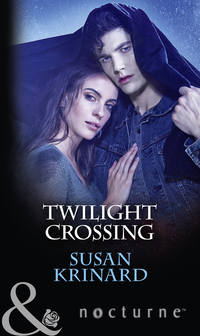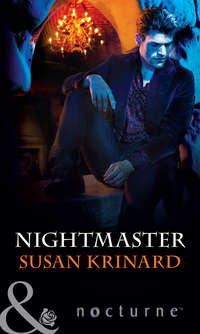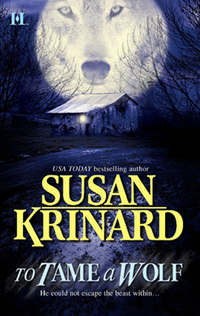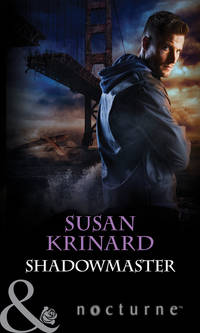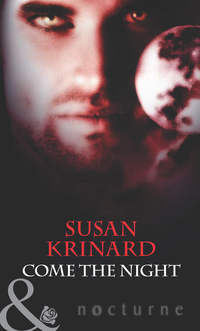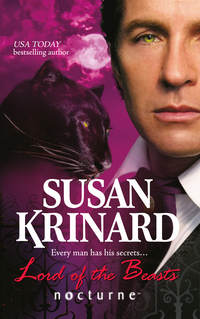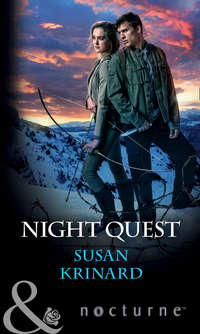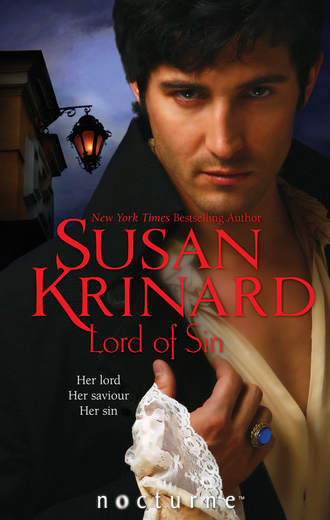
Полная версия
Lord of Sin
“What sort of reputation?”
The marchioness had no opportunity to answer. The gentlemen were drawing their horses alongside the landau, the elder on a black stallion he held under remarkable control, the younger on a bay mare. Deborah’s eyes grew very wide. The younger man tipped his hat and returned her regard, his fair hair falling across his brow.
But Nuala gave him no more than a passing glance. She stared up at the taller man, who had also raised his hat to Lady Oxenham. He seemed to be completely unaware of Nuala’s presence.
“My dear Lord Donnington,” the marchioness said, extending her hand. “How pleasant to see you again.”
The earl took her hand and kissed the air over her fingers. “Lady Oxenham,” he said. “I trust you are enjoying the afternoon.”
She allowed him to hold her hand a little longer than was strictly necessary. “Indeed I am,” she said, and turned to her guests. “Lady Orwell, Lady Charles, may I present the Earl of Donnington.”
Deborah continued to gaze at the younger man as if she hadn’t heard the introduction. Lord Donning-ton bowed stiffly over his saddle.
“Lady Orwell,” he said, “Lady Charles.”
Nuala met Sinjin’s hard brown eyes. She had never forgotten for an instant how handsome he was, how lean and graceful, how utterly masculine in his coat, breeches and riding boots. Nor had she forgotten the scorn in his eyes four years ago, when she’d admitted to being a witch. A witch who had posed as a maid at his brother’s estate, Donbridge, and who had made herself an essential part of the events that had resulted in Giles’s death, and the disruption of everything Sinjin had known and believed.
She clasped her hands to keep them from trembling. “Good afternoon, Lord Donnington.”
He ignored her greeting and gestured to his friend. “May I be permitted to present Mr. Felix Melbyrne.”
Lady Oxenham inclined her head. “Mr. Melbyrne. I understand that you are but recently come to London.”
“It is true, Lady Oxenham,” Melbyrne said, nervously shifting his reins in his hands. “I am most honored to make your acquaintance.” His gaze wandered back to Deborah. “And yours, Lady Orwell, Lady Charles.”
Deborah blushed, bobbed her head and smiled. “I…I am happy to meet you, Mr. Melbyrne.”
“And I,” Nuala said. She searched the young man’s eyes. “Lady Orwell and I are also recent arrivals.”
“I…I see.” Mr. Melbyrne continued to fidget in a very telling manner. “There is so much to see and do.”
“Yes,” Deborah said, “I agree.”
“And you, Lady Charles?”
Sinjin’s voice was as harsh as his gaze, drawing a start of surprise from the marchioness. Nuala didn’t smile. She was compelled to concentrate entirely on making certain that her distress was not visible to him or her companions. That Deborah should not guess that she and the Earl of Donning-ton had met before under the most painful of circumstances.
“It is very different from the countryside Lord Charles preferred,” she said.
A flash of what might have been chagrin passed over Sinjin’s face. “Permit me to offer my sincere condolences on the loss of your husband.”
“You are very kind, Lord Donnington.”
“The earl was also kind enough to offer me his condolences,” the marchioness said, more brusquely than was her habit. “Having been out of the country so long, he did not learn of Charles’s passing until very recently. But then again, my brother-in-law was very reclusive. Many forgot his existence entirely.”
“Not I, I assure you,” Sinjin said. “We were together at Eton. I was deeply grieved.”
The marchioness inclined her head. “You have been much occupied since your return from India.”
“Oh,” said Lady Orwell quickly, as if she were eager to change the subject. “You have been in India? How fascinating.”
Mr. Melbyrne said something about having visited some other exotic clime, but Nuala wasn’t listening. She watched Sinjin without quite looking at him, taking him in with her senses as well as her eyes.
He had changed. Oh, not so much in appearance, though there were a few more lines in his face and a deep tan gained from several years in India. He had lost none of his handsomeness. No, the greatest change was within him. He had always been somewhat cynical, a man who had a reputation as a lover and a gambler. But he had shown compassion toward his former sister-in-law, Mariah, when she had been in trouble. He was capable of great feeling and unflinching loyalty.
That Sinjin seemed to have vanished. His face revealed no expression, even as he conversed easily with Lady Oxenham. His dark eyes were shadowed, as if he seldom slept, and his mouth was tight.
There was no mistaking his coldness toward her. They had parted so abruptly at Donbridge, and that was her doing. Her cowardice. Had his brother’s death and Lady Westlake’s subsequent madness turned him into the man she saw before her?
You knew it might be like this. Yet his unspoken hostility was much worse than she might have imagined. A part of her had hoped for something different, a neutral meeting, some way she might explain without having to face his mistrust and obvious resentment.
He finds you in London, a lady at least in name, a stranger he never had any real reason to trust. I told him so little. Is it any wonder…
She had thought of laying ghosts to rest. But now, suddenly, she was afraid.
“We must go,” Sinjin said, touching the brim of his hat. “I shall look forward to seeing you again, Lady Oxenham, Lady Orwell.” He paused. “Lady Charles.”
He wheeled his horse about and started away, dodging a town coach and four. Melbyrne lingered, his horse shuffling nervously beneath him, opened his mouth and bowed from the saddle before riding after his friend.
“How very interesting,” Lady Oxenham murmured. But she didn’t elaborate, and soon the landau was moving again. Nuala found it impossible to keep up her part in the conversation.
He is suffering, she thought. Because of me.
And he had judged her, just as the witch-finders had judged her family.
“It was he,” Deborah whispered, leaning close to Nuala’s ear.
“I beg your pardon?”
“The young man I saw at the Academy!”
Nuala took herself in hand. “Mr. Melbyrne?”
“Yes. He is handsome, is he not?”
“Yes. Very handsome.”
“And that man with him…Lord Donnington—” She shuddered. “He was quite intimidating. Very courteous in his manner, but so distant.”
“Perhaps he had important things on his mind.”
“Oh, most important,” Lady Oxenham put in. “What suit he ought to wear tomorrow, where he might spend a stimulating evening playing at cards, what new bit of horseflesh he might choose to buy. All very pressing matters.”
“But I thought you liked him!” Deborah protested.
“I do. He has certainly kept up the family’s interests in the East and has done well by his tenants at Donbridge. But he has only been in England three months, and already he is influencing the most fashionable young men…not necessarily for the better.”
“The Forties?” Deborah asked.
“Quite so. Sinjin seems to take a rather dim view of women, as well as marriage—it is obvious that he was once hurt badly by one of our sex.”
Nuala knew just how badly Sinjin had been hurt, but she said nothing.
“Unfortunately,” Lady Oxenham continued, “Mr. Melbyrne is obviously in Lord Donnington’s thrall. A pity. Such a promising fellow. Possessed of rather a good income, I believe.”
Deborah fell silent, biting her lip. Nuala sighed. Not even a blind man could have failed to notice how intently the two young people had studied each other.
Sinjin must have noticed, too. He had obviously not approved….
Stop, stop, stop!
Desperately Nuala tried to distract her mind. But all she could think of was Sinjin’s face. The way it had looked the last time they’d been together at Don-bridge four years ago.
“I don’t need the help of a witch,” he had said. Such anger. Such contempt…
“My dear Nuala,” Lady Oxenham said.
“Forgive me,” Nuala said, snapping back to the present. “I wasn’t listening.”
“The marchioness is to give a ball,” Deborah said. “We are both invited.”
“A ball?” Nuala repeated stupidly.
“A fancy-dress ball,” the marchioness said. “It is rather short notice…only four weeks from Tuesday…but my youngest son is returning from his service in Africa, and I wished to celebrate properly. He is very fond of fancy-dress balls.” She gave Nuala a direct stare. “You shall attend, of course.”
“I ought not—” Deborah began.
“You shall wear something bright,” Lady Oxenham said. “There is no time for one of the Paris modistes, of course, but I have a dressmaker who is just as skilled and almost as inventive. I shall send her to you.”
“Thank you, Lady Oxenham,” Deborah murmured, overcome by the old woman’s determination.
“Of course, your friends shall all be invited, as well,” Lady Oxenham said. “I am quite certain that the dowager duchess will have chosen her costume even before she receives the invitation.”
Deborah laughed behind her fan. Nuala was in no mood for humor.
Will he be there? It would be rude to ask Lady Oxenham such a question, but the very thought made her hands begin to tremble. After all these years, a man had such power over her emotions.
But she would not let emotion rule her. Before Donnington, she had been successful in her work by keeping her head and maintaining some distance from those she helped. Celebration came only after the work was completed to her satisfaction.
Every time but the last.
As the afternoon advanced, the strollers, horsemen and coaches began to disperse for home. Nuala caught no further glimpse of Sinjin or his protégé. Nuala’s own modest carriage was waiting at the marchionness’s residence, as was Deborah’s. Nuala thought of the handsome town house her husband had bequeathed to her, of its emptiness and the loneliness that stalked every room.
“Have you given the matter we discussed any further thought?” she asked Deborah as they stood on the pavement. “There is no need to maintain two separate households when we might so easily share one without the least inconvenience.”
“I have thought about it,” Deborah said. “I think I should like it very much.”
Nuala restrained herself from embracing the girl. “Which house shall we take?”
“Why not yours? Mine is much too large, and I can easily find a tenant for the Season.”
“If you are quite comfortable with the choice…”
“I am. I am certain that we shall enjoy it immeasurably,” Deborah assured her.
They exchanged light kisses on the cheek in the Parisian style. Deborah took her footman’s hand and climbed into her carriage. Nuala watched the vehicle clatter down the road and turned for her own carriage.
“You are good for the child,” Lady Oxenham commented, coming up behind her.
“I hope I am,” Nuala said. “I hope that we can learn from each other.”
“What has she to teach you, my dear?”
Humility. Innocence. All the things Nuala had lost without realizing it.
“Thank you, Lady Oxenham, for the pleasant ride,” she said, avoiding the question.
“You are welcome at any time,” the marchioness said.
Nuala smiled and stepped up into her carriage. Her coachman snapped the reins, and the victoria jerked into motion. Instead of going directly home, she instructed Bremner to drive toward Kensington and Melbury Road for her appointment with Maggie. When she arrived, Maggie herself came to the door. She was dressed in an oversize man’s shirt and trousers rolled up to her ankles, both garments liberally splattered with paint.
“Nuala!” Lady Riordan said, waving Nuala into the vestibule. “I didn’t expect you until later this evening.”
“I’m sorry, Maggie. I hope this is not too great an inconvenience.”
“Not at all. Come in.”
Nuala gave her cape to the rather odd-looking footman, whose melancholy face somewhat resembled that of a mule. His livery was less than spotless, but Maggie seemed not to notice. She never noticed such trifling things, and Nuala suspected that her servants took terrible advantage of her negligence.
I was a servant many times. I have no right to judge.
Without observing any of the usual niceties and small talk, Maggie led Nuala upstairs to the first floor, where she kept her studio. What might have been a large drawing room had been given over to everything a painter might require: easels, canvases, brushes, paint and many varied and curious objects Lady Riordan had found of interest.
Maggie rushed to a large, blank canvas and stood before it, staring with a sort of ferocity as if a picture might magically appear by the sheer force of her will. “It will be marvelous,” she said, brushing an untidy curl away from her forehead. “Please sit over there, Nuala.”
Lifting her skirts to avoid the suspiciously wet-looking smears of paint on the once-handsome floor, Nuala took the chair Maggie had indicated. The young woman hurried over, posed Nuala as if she were a doll, stood back, then readjusted Nuala’s position.
“There,” she said, and without another word began to paint, her tongue pushing out from between her teeth. For the next two hours Nuala sat quietly. Her unoccupied mind continued to drift toward thoughts of Sinjin: the handsome but weary lines of his face, his superb seat on his black stallion, the way he had looked at her as if she were an enemy.
I must explain. But how?
“That’s enough for today,” Maggie said, standing back from her canvas with an air of satisfaction. She glanced past the painting and frowned. “You’re very tired, Nuala. Shall I get you some tea? Biscuits?”
“I’ve merely been lost in thought,” Nuala said, rising. “I believe I shall spend a quiet evening at home.”
“Hmm,” Maggie murmured, her attention focused one again on her painting.
Nuala smiled, retrieved her things and walked toward the door, making no attempt to see Maggie’s work.
“Nuala?”
She half turned. Maggie was wiping her hands on a rag, her air still distracted.
“Tameri told me to remind you about the garden party next week,” she said. “I almost forgot, myself.”
The garden party. Nuala had almost forgotten about it, though Tameri had issued the invitations over a month ago.
“Of course,” she said. “Thank you, Maggie. I’ll be there.”
The young woman gave a most unfeminine grunt and began to clean her brushes. Nuala was escorted to the door by the doleful footman. She waited for her carriage to be brought round from the mews and closed her eyes.
It must be soon. The next time she met him, she would make everything clear. Then, if he chose to continue to hate her, she would understand.
LADY CHARLES.
Sinjin bit down with such force that his cigar nearly snapped in two. Lady Charles Parkhill.
“Good God, Donnington,” Lord Peter Breakspear said, blowing out a long stream of smoke from his own cigar. “One would think you had just learned that Poole had gone out of business.”
Sinjin turned to look at his friend, letting his mouth ease into a cynical smile. “I’ve no fear of that,” he said. “My patronage alone would keep them solvent for another century.”
“Ah,” Lord Peter said, nodding sagely. “Then it must be a woman.”
A sharp and entirely unjustified retort came to Sinjin’s lips. He bit it back. “I never have trouble with women.”
“Did I say anything about trouble?”
Breakspear arched his brows. Sinjin ignored him, walked to the sideboard and stubbed out his cigar, glancing around the drawing room. Six of the Forties were present at this meeting in Sinjin’s town house: Breakspear, a gentleman in his midthirties who held a strong attraction for the ladies; Melbyrne; Harrison, Lord Waybury, a staunch Tory of traditional convictions; Mr.Achilles Nash, the most cynical of the group, ever ready with a quip; Sir Harry Ferrer, portly and often ill-tempered; and Ivar, Lord Reddick, as much a devoted Liberal as Waybury was a Conservative.
Nash was regarding his glass of brandy with his usual bored expression; Ferrer was already drunk. Reddick was intently conversing with Waybury on the subject of politics and Melbyrne was in a corner, his face suspiciously blank. Watching everything with a curious eye, Erskine, who had refused full membership in the club but was welcome nonetheless, remained in the background as he always did.
“I say,” Waybury said, stabbing the air with his cigar, “you’re wrong, Reddick. Salibury is doing an excellent job with his Irish programme.”
“It isn’t the same as Home Rule,” Reddick insisted. “When Gladstone returns—”
“He’ll never be reappointed,” Waybury said with some heat.
“What is your opinion, Donnington?” Reddick asked, strolling across the room to join him and Breakspear.
“I doubt he’s ever bothered to consider the issue,” Waybury said. “He may occasionally join us in the Lords, but his interest in politics is minimal at best.”
Sinjin turned his smile on Waybury. “I happen to support Gladstone’s policies,” he said. “I believe he will eventually be vindicated.”
Waybury waved his hand in disgust. “The Liberal Party will do this country in.”
“I doubt it matters who holds the reins,” Nash said from across the room. “What do you think, Erskine?”
Leo folded his arms across his chest. “I prefer to remain neutral.”
“As neutral as you are on the subject of marriage?” Breakspear asked.
“I am not eager to tie myself down, as Donning-ton will attest,” Erskine said mildly. “I simply have no objection to a man marrying before he reaches middle age.”
“Perhaps Erskine is less stuffy than he appears,” Nash said with a cynical smile. “After all, it is not as if marriage need hamper one’s appreciation of other women.”
“Some of us prefer fidelity after marriage,” Way-bury said.
Breakspear laughed. “And before. You’ve been pretty faithful to your current doxy. Do you think you’ll avoid temptation once you’ve found yourself a worthy wife?”
“I should think it depends on the wife,” Erskine said before Waybury could reply. He poured himself a glass of water from a crystal decanter on the sideboard. “With the right woman—”
“There is no female in the world who can tie me to her apron strings,” Sinjin snapped, remembering Erskine’s mocking wager at the Academy.
The other men exchanged glances. “What is it, Sin?” Nash asked.
“I asked him the same thing,” Breakspear said. “Woman trouble.”
Ears pricked and nostrils flared as the pack closed in. Reddick chuckled. “Has Adele demanded a few too many fripperies this month?” he asked Sinjin. “Has she found a more generous patron? If not, I shall be more than happy to take her off your hands.”
“Adele,” Sinjin said between his teeth, “is free to make her own decisions. I suggest we change the subject.”
“But why are we here if not to talk of women?” Nash asked. “If it’s not Adele, who is it?”
Leo set down his empty glass. “Have any of you been introduced to Lady Charles Parkhill?”
“Erskine…” Sinjin growled.
“We saw her at the Academy,” Leo continued. “Sin quite admired her.”
“Ah, yes,” Breakspear said. “She has only just come to London this Season. Never been before, I hear. Parkhill hid her away on his estate.” He shook his head. “At least the unfortunate man had a fair companion to comfort him in his final hours.”
“Is it true that she is a country curate’s daughter?” Waybury asked. “Poor Lord Charles wouldn’t have had many opportunities to meet potential wives, especially the sort who’d be content to give him constant nursing. Do you suppose he hoped to obtain an heir before he—”
“Enough about Parkhill,” Sinjin said. “Let the man rest in peace.”
“I wonder if his little widow is resting peacefully,” Nash said. “If she had so little enjoyment of her marriage, she might be—”
“Enough.” Sinjin felt the irrational desire to plant his fist in Nash’s face. He must be going insane.
And all because of her.
“I see that we have struck a nerve,” Breakspear said in a loud whisper.
Sinjin poured himself a brandy, splashing the liquor over the sides of the glass. “Melbyrne!”
The boy looked up, his eyes dazed. “I beg your pardon?”
“Are you going to sit in that corner all evening?”
Felix got up hastily, smoothed his coat and joined the others. “I’m sorry. Were we discussing Salisbury? I think—”
Breakspear laughed. “The subject is the ladies,” he said, “and Sin’s nasty mood.” He peered into Melbyrne’s eyes. “I say, what’s going on in that head of yours, boy? Have you finally been stricken by some pretty face?”
“I was never convinced that the initiation took with our junior member,” Nash said. “Perhaps we ought to repeat the exercise.”
Felix drew himself up. “I may be young,” he said, “but I am not a fool.”
“Perhaps you’ve also admired Lady Charles?”
The boy flushed. Sinjin downed the brandy in one swallow. He knew exactly what Felix had been thinking while he’d been sitting alone, looking like nothing less than an habitué of an opium den.
Lady Orwell. When they’d met Lady Oxenham and her friends in Hyde Park, Melbyrne had sat on his horse with his mouth agape, as tongue-tied as a girl at her first dance. He hadn’t listened to the advice Sinjin had given him at the Academy; to the contrary, his introduction to the lady in question had obviously increased his admiration.
“It is not Lady Charles,” Melbyrne said with a false air of indifference.
“Out with it, boy,” Nash said. “We have sworn to be brothers and keep no secrets amongst us.”
Melbyrne looked at Sinjin and dropped his gaze. “Mrs. Tissier!” he blurted.
Everyone laughed. “Was that your idea, Sinjin?” Nash asked.
“Why should it be?” Sinjin said, his equanimity restored. “As Melbyrne said, he’s no fool.”
“She’s already agreed, then?” said Breakspear. “It’s all arranged?”
“She’ll take you on a long, sweet ride…won’t she, Sin?” Nash said.
“One might ask you the same question,” retorted Waybury.
They launched into a testy but civilized quarrel. Sinjin took Felix aside.
“Has it been arranged?” he asked.
“I haven’t asked her yet,” Melbyrne said, meeting Sinjin’s gaze stubbornly. “But from all you’ve said, it should not be difficult to win her.”
“There are ways to go about this sort of thing. I’ll speak to you about it tomorrow, before the parade.”
“Yes. Of course.”
Sinjin slapped the young man’s shoulder. “You’ve made an excellent choice, Melbyrne.”
Felix attempted a grin, turned to the sideboard and reached for a bottle. Sinjin left him to it. One by one the men departed, called to some dinner or other amusement. Melbyrne was last to leave, all studied nonchalance as if he were set on proving to the world that he was far older than his twenty-two years.
Sinjin lit another cigar and sat in his favorite chair, alone with the empty glasses and overflowing ashtrays. In a moment the parlor maid would cautiously knock on the door and enter to clean up the mess. Sinjin was in no hurry to summon her.
Though there had obviously been some reluctance on Melbyrne’s part, he had finally chosen a wise course of action. Tissier would take him in hand, and when they parted, as they eventually must, he would no longer play the mooncalf with naive young widows who would only bring him grief.
Sinjin’s unwilling thoughts drifted to Lady Charles, and instantly his cock hardened. There was no reason for such a reaction, none whatsoever; he had certainly felt no attraction to her when she’d posed as a maid at Donbridge, and their dealings after she had shed her disguise had not been cordial.





